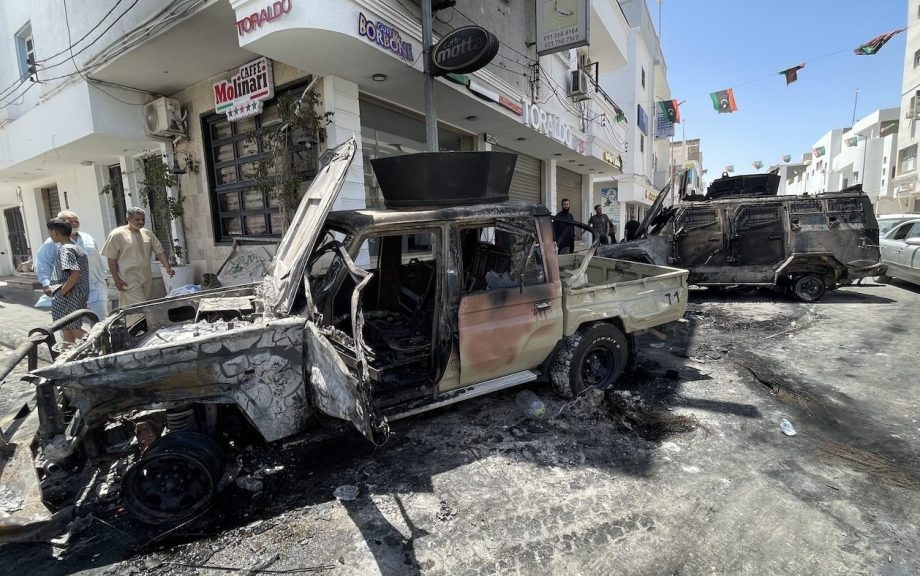Turmoil shatters fragile calm in Libya

Image: Middle East Monitor
Libya, a nation rich in oil but scarred by decades of political turmoil and foreign meddling, has once again plunged into violent chaos. The assassination in mid-May of Abdelghani Al-Kikli – known as ‘Ghnawa’ – the powerful leader of the Tripoli-based militia Stability Support Apparatus (SSA), ignited brutal clashes between rival factions, engulfing the capital in some of the fiercest violence seen in years.
Soon after the confronatations, Prime Minister Abdulhamid Dabeiba’s United Nations (UN)-recognized government declared an end to the fragmented “parallel security systems” and launched a sweeping overhaul of the country’s security forces. Yet, the government’s portrayal of Ghnawa’s death as a step toward restoring state authority was met with widespread doubt. Protests erupted, with citizens demanding Prime Minister Dabeiba’s resignation, laying bare the fragile legitimacy of an administration already plagued by weak popular support and accusations of deep-rooted corruption and kleptocracy.
Meanwhile, the government based in the east of the country, the Government of National Stability (GNS), led by Khalifa Haftar’s forces, has largely remained detached from the violence. However, it has voiced support for calls for Dabeiba’s government to resign, spotlighting the persistent political divide in the country.
This political schism is not an exception but rather a reflection of its turbulent history shaped by two civil wars. The 2011 revolution, part of the Arab Spring, toppled Muammar Gaddafi’s 42-year rule after a brutal conflict backed by NATO intervention. His death plunged the country into chaos, splitting power between the UN-recognized Government of National Unity (GNU) in the west and the rival GNS in the east, led by Haftar’s Libyan National Army (LNA).
The 2014 civil war intensified this division, with foreign powers fueling the conflict and turning Libya into a proxy battleground. Although a 2020 UN-brokered ceasefire sparked cautious hope for peace and elections, internal disputes and external interference continue to stall progress toward lasting reconciliation.
LIBYA IS A FRACTURED MOSAIC OF FOREIGN INTERESTS
Libya’s oil-rich but fractured landscape has become a playground for foreign powers exploiting its instability to secure strategic and economic gains. For example, Turkey backs the UN-recognized GNU with military support, mostly because of maritime oil and gas deals they have brokered, while Russia prop up Haftar’s forces in the east through proxies in exchange for favorable strategic access to ports and other transit centers.
Indeed, Russia’s growing influence in Libya, particularly around key oil facilities and air bases, alongside activities previously associated with the Wagner Group, has turned the country into a proxy battleground. This has been exacerbated by extensive oil smuggling operations. According to a 2024 report by Bloomberg, up to 40 percent of domestically refined fuel is illicitly exported. Much of this originates from Russia and is diverted to European markets that have banned such imports. This smuggling network extends across Libya’s porous southern border into Sudan, where the fuel is believed to support the Sudanese Rapid Support Forces (RSF) militia, fuelling regional conflict.
Meanwhile, foreign interference and internal rivalries — notably between Haftar and Prime Minister Dbeibeh — have politicised resource management. This has led to oil production blockades and hindered efforts to unify the National Oil Corporation. Thus, Libya’s 2025 target of producing 2 million barrels of oil per day is being jeopardised amid ongoing violence and disruptions in Tripoli, which further strain oil logistics and deepen the crisis.
TRANSIT POINT FOR MIGRANTS
ICE24 specialises in identifying and assessing potential risks that could affect your operations in Libya. Through our comprehensive Risk & Threat Assessments, we analyse security threats and provide practical, actionable advice to protect your interests. With our ICEWEEKLY and ICEMONTHLY reports, you’ll have verified, real-time intelligence at your fingertips, enabling you to track developments and make informed decisions in this complex environment. Contact us to explore how you can stay ahead of the pulse and protect your interests and assets: [email protected]
